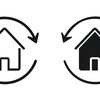CHIP Reverse Mortgage? Nothing to Fear Anymore

The CHIP Reverse mortgage has been taking the Canadian market by storm and is seen as one of the most convenient and financially rewarding ways to secure a mortgage today and enjoy retirement tomorrow. It can be a valuable tool for retirees to maximize income streams by utilizing their biggest assets: their homes. In short, CHIP (Canadian Home Income Plan) is a reverse mortgage that you can secure against the value of your home. It allows you to unlock that value at any given time without having to move away or sell your home. In contrast to a traditional mortgage, a reverse mortgage does not call for the homeowner to make any monthly loan repayments.
It is intended for homeowners over the age of 55 who can access up to 55% of their property’s value, and the money received is tax-free with no restrictions on how or when to use it. If you are a homeowner in Canada looking to enjoy a more relaxed and lucrative retirement, then CHIP reverse mortgage might just be what you need to get started.
But first, how exactly do CHIP Reverse Mortgages work? In a conventional mortgage, the borrower makes regular month, weekly, or bi-weekly payments to the lender, whereas in a reverse mortgage, as the name suggests, the lender makes payments to the borrower. The choice of payment receipt can be decided by the homeowner, and no payments for the principal or interest rate amounts are to be made until you leave the house.
An increasing number of people are gravitating towards reverse mortgages simply because the financial gains are hard to overlook, and here’s why:
55% of Tax-Free Equity
Withdrawing investments early can translate into huge tax penalties, which is why so many people hesitate in doing so. Plus, retirement is extending while company pensions are generally insufficient, effectively putting senior citizens in a financial pickle. With a CHIP reverse mortgage, you have the freedom to access 55% of your property’s equity without paying a single dollar in taxes. Another definite pro is that there are no monthly mortgage payments, so zero negative cash flow.
Full Control & Ownership
With a CHIP reverse mortgage, you are not expected to evacuate the place any day, which means that there is no immediate selling or shifting involved. You can choose to retain ownership of your home for as long as you desire.
Paying back the loan or interest is only required when you move to a different place, sell your home or pass away. In that case, the money received from the proceeds of the property will be adjusted as your loan repayment, and the remaining equity will go into your pocket. Although, you still need to ensure that your home is in optimal condition and your property taxes and insurance premiums are paid on time.
After the passing of the borrower, the heirs will be responsible for repaying the mortgage and will typically have the autonomy to sell the place for the purpose of the loan repayment. The period of time taken for you, your heirs, or your estate to make the loan repayment will differ depending on the situation at hand. In case of your death, the estate might be given a lead time of 6 months to repay. On the other hand, if you were to move into long-term care, a year’s time may be provided. Make sure you clearly ask these questions from your lender, so there is no room for ambiguity later.
Greater Independence in Financial Decisions
You will have the freedom to decide how you would like to receive your money – you could either opt for a periodic payment system or a lump sum amount, or a combination of the two. Other than that, you will also be in charge of how you wish to spend this money since the lender doesn’t decide its allocation, which means that you could use it to pay off expenses, debt, or financing other plans. Other common areas where people use this money are for house maintenance, taking trips, or kick-starting a new business project. Planning and setting your own priorities will be solely under your control.
A Form of Non-recourse Loan
A lot of people wrongly assume that the value of a CHIP reverse loan can exceed the initial value of the home, which will put the future heirs of the property in a tough monetary position. That is not correct. A CHIP reverse mortgage is a non-recourse loan. It essentially means that you, your estate, or your future heirs will not be subjected to a higher loan than the appraised value of the property at mortgage maturity.
While there are numerous reasons to take out a CHIP reverse mortgage, there are a few things you need to know that will help you make an informed decision. In contrast to traditional mortgages, CHIP loans come with a higher interest rate which can sometimes increase your final debt. You will also need to be mindful of the extra setup costs that are deducted from the money you receive. These costs include application fees, closing charges, legal costs, and property appraisal fees. Also, try to avoid any prepayment fine that could result from you paying off the CHIP mortgage earlier than its due date.
Is CHIP Reverse Mortgage a Good Idea?
A CHIP reverse mortgage is ideal if you are looking for an additional way to earn an income during your retirement years, especially for unexpected medical bills, home maintenance, or leisure. Because there are flexible ways to cash the money you receive from the reverse mortgage, it can give you more control over your finances. The money you receive is not affected by the Guaranteed Income Supplement or Old-Age Security benefits you might be receiving. Moreover, if the value of your property goes up, the surplus that remains after value loan repayment will go to you or your heirs. In the opposite case, however, you might need to forego the ownership of the estate to the lender. But if you do your homework right, you can avoid such a scenario very easily.
Before you get involved in the process of receiving a CHIP Reverse Mortgage, it is crucial that you do your research and ask the lender the right questions, which may include:
- How much are the total fees that I would have to pay?
- What will be the interest rate charged?
- What factors can make you default on the mortgage?
- What is the lead time given if you wish to move from your home?
- Are there are fines if you decide to sell your estate within a certain period of time?
- In case of your demise, how much lead time is given to your heirs and the estate to make the loan repayment?
- What happens if your heirs or estate fail to make the repayment in the assigned period of time?
- What happens if the amount of loan turns out to be higher than your home value during the time of the sale?
Find Out If You Can Apply for CHIP Reverse Mortgage
The Canadian government has made it quite easy for senior Canadian citizens to apply and qualify for a CHIP reverse mortgage. Lenders generally decide based on the following factors:
- Age – People over 55 years.
- Home Ownership – You are required to own a home and be a primary resident there for at least six months or more, the appraised value of which is taken into account.
- Home Location – This is an important factor that will determine the value of the property. Homes located in the city and in top-notch condition are typically preferred.
- The amount of loan secured – The value of the loan secured against your home must be less than the value that will be given to you from the CHIP reverse mortgage.
- Interest Rates – The current market interest rate depending on the risk involved with your property.
On your application, it is important that you write down the names of all the members listed on your property’s title and ensure that they are all a minimum of 55 or older. Before applying, you also need to be mindful of paying off any accrued balance that you may have from other lines of credit or loans secured against your property.
If you have consulted your options with a professional advisor as well as family members and are confident in your decision, the CHIP Reverse Mortgage might be one of the best financial decisions you ever make. For an expert opinion regarding your mortgage and home equity loan solutions that are specifically tailored to your needs, contact Clover Mortgage .





